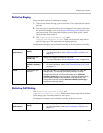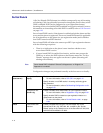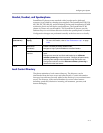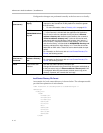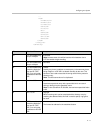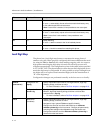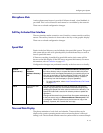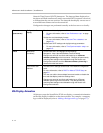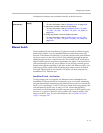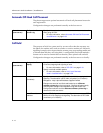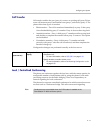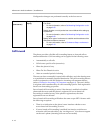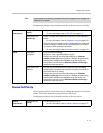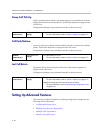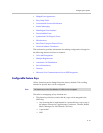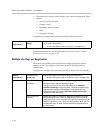
Configuring Your System
4 - 15
Configuration changes can performed centrally at the boot server:
Ethernet Switch
The SoundPoint IP and SoundStation IP phones contain two Ethernet ports,
labeled LAN and PC, and an embedded Ethernet switch that runs at full
line-rate. The Ethernet switch allows a personal computer and other Ethernet
devices to connect to the office LAN by daisy chaining through the phone,
eliminating the need for a stand-alone hub. The SoundPoint IP switch gives
higher transmit priority to packets originating in the phone. The phone can be
powered through a local AC power adapter or can be line-powered (power
supplied through the signaling or idle pairs of the LAN Ethernet cable). Line
powering typically requires that the phone plugs directly into a dedicated
LAN jack. Devices that do not require LAN power can then plug into the
SoundPoint IP PC Ethernet port.
SoundPoint IP Switch - Port Priorities
To help ensure good voice quality, the Ethernet switch embedded in the
SoundPoint IP phones should be configured to give voice traffic emanating
from the phone higher transmit priority than those from a device connected to
the PC port. If not using a VLAN (VLAN set to blank in the setup menu), this
will automatically be the case. If using a VLAN, ensure that the 802.1p
priorities for both default and real-time transport protocol (RTP) packet types
are set to 2 or greater. Otherwise, these packets will compete equally with
those from the PC port. For more information, refer to Quality of Service
<QOS/> on page A-47.
Central
(boot server)
Configuration file:
sip.cfg
To turn idle display animation on or off.
• For more information, refer to Indicators <ind/> on page A-65.
To replace the animation used for the idle display.
• For more information, refer to Animations <anim/> <IP_300/>,
<IP_330/>, <IP_400/>, <IP_500/>, <IP_600/>, <IP_4000/> on
page A-66.
To change the position of the idle display animation.
• For more information, refer to Graphic Icons <gi/> <IP_300/>,
<IP_330>, <IP_400/>, <IP_500/>, <IP_600/>, <IP_4000/> on
page A-68.



